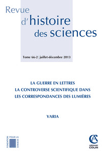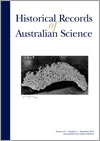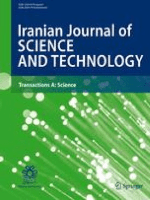
History of Geo- and Space Sciences
Scope & Guideline
Exploring the rich tapestry of geo-science history.
Introduction
Aims and Scopes
- Historical Analysis of Scientific Discoveries:
The journal delves into the historical context of significant scientific discoveries in geophysics and space sciences, exploring how these advancements were achieved and their impact on modern science. - Preservation of Scientific Heritage:
It aims to document and preserve the legacies of key figures, institutions, and observatories in the fields of geophysics and space science, ensuring that their contributions are recognized and understood within the broader scientific community. - Interdisciplinary Approaches:
The scope includes interdisciplinary research that connects history with other fields such as meteorology, geology, and atmospheric sciences, highlighting how historical practices influence current scientific methodologies. - Exploratory and Observational Studies:
The journal features studies based on historical observations and data, such as meteorological records and auroral photography, contributing to a better understanding of past scientific practices and their relevance today. - Cultural and Social Contexts of Science:
It also explores the cultural and social factors that have influenced the development of scientific disciplines, including the roles of gender, societal views, and international collaborations.
Trending and Emerging
- Space Exploration Narratives:
There is an increasing focus on personal narratives and historical accounts related to space exploration, emphasizing the human aspect of scientific endeavors and their societal impacts. - Interdisciplinary Historical Studies:
Emerging themes include interdisciplinary studies that connect historical narratives with modern scientific practices, indicating a trend towards a more integrative approach to understanding the evolution of scientific thought. - Cultural Perspectives on Science:
A growing interest in the cultural and social dimensions of scientific practice is evident, with research exploring how cultural contexts shape scientific inquiry and public perception of science. - Historical Data Utilization in Current Research:
The utilization of historical data for contemporary research applications is gaining prominence, suggesting an increasing recognition of the value of past scientific observations in informing present-day scientific challenges.
Declining or Waning
- Traditional Geophysical Instrumentation:
There has been a noticeable decrease in articles focusing on the history and development of traditional geophysical instruments, suggesting a shift towards more contemporary methodologies and technologies in the field. - Classical Meteorological Studies:
Studies centered around classical meteorological observations and networks, such as early weather stations, are appearing less frequently, possibly due to a focus on more advanced and integrated climate science methodologies. - Historical Biographies of Lesser-Known Scientists:
While biographies of prominent figures remain relevant, there is a decline in the publication of works focused on lesser-known scientists, indicating a potential shift towards more recognized contributors in the field. - Localized Historical Case Studies:
Research articles concentrating on localized or singular historical case studies seem to be waning, with a growing preference for broader, more comparative analyses that connect various historical developments.
Similar Journals

Revue d Histoire des Sciences
Chronicling the Evolution of Scientific Ideas.Revue d'Histoire des Sciences is a distinguished academic journal published by Armand Colin, focusing on the intricate interplay of history and philosophy within the sciences. Since its inception in 1973, the journal has served as a vital platform for researchers, scholars, and students interested in exploring the historical dimensions of scientific development. With an ISSN of 0151-4105 and an E-ISSN of 1969-6582, this journal is recognized within the academic community, achieving a modest 2023 Scopus ranking of Q3 in History and Philosophy of Science, positioning it within the 41st percentile of its category. The journal offers a prestigious space for rigorous discourse, critical analysis, and innovative research aimed at advancing our understanding of the scientific enterprise's past. While it operates under a traditional access model, the ongoing commitment to rich scholarly content ensures that the contributions will resonate with those dedicated to the intersections of history, science, and philosophy, providing insights into how historical context shapes scientific inquiry and advancement.

PHYSICS IN PERSPECTIVE
Advancing Understanding Through Historical ContextPHYSICS IN PERSPECTIVE, published by SPRINGER BASEL AG, is an esteemed journal dedicated to the intricate interplay between the history of physics and its contemporary implications. With an ISSN of 1422-6944 and an E-ISSN of 1422-6960, this journal has established itself as a pivotal resource for researchers, scholars, and students who seek a deeper understanding of physics through a historical lens. The journal enjoys a Q1 ranking in History and a Q3 ranking in Physics and Astronomy (miscellaneous), illustrating its significance in the arts and humanities as well as its notable contributions to physics scholarship. Published in Switzerland, it provides a unique platform for interdisciplinary dialogue, combining historical analysis with modern physics discussions. As it continues to grow through its converged years from 1999 to 2024, PHYSICS IN PERSPECTIVE remains committed to enriching the academic community and fostering innovative research that bridges the past and present of the physical sciences.

Historical Records of Australian Science
Archiving the Pioneers of Scientific Thought.Historical Records of Australian Science is a premier academic journal published by CSIRO PUBLISHING, focusing on the rich legacy and contributions of Australian science from its inception to contemporary advancements. The journal is integral to the Arts and Humanities and Social Sciences fields, operating within a unique niche that fosters interdisciplinary dialogue and research. With its ISSN 0727-3061 and E-ISSN 1448-5508, it encompasses a diverse scope spanning historical analysis, philosophy of science, demography, and human factors. Although it is currently categorized into Q3 and Q4 quartiles across various relevant spheres in 2023, the journal strives for excellence in archiving pivotal scientific milestones as it continues to publish valuable insights, encouraging submissions from scholars globally. Its commitment to enriching scholarly discussion makes it a crucial resource for researchers, professionals, and students keen on exploring the historical narratives that have shaped Australia’s scientific landscape. With a convergence of knowledge from 1980 through to 2024, the Historical Records of Australian Science stands as a vital repository for those delving into Australia’s scientific heritage.

Spontaneous Generations-Journal for the History and Philosophy of Science
Illuminating the Past to Understand the Future of ScienceSpontaneous Generations: Journal for the History and Philosophy of Science is a dedicated publication focusing on the rich fields of history and philosophy within the scientific domain. Published by the Institute for the History and Philosophy of Science and Technology, this journal provides a vital platform for scholars, researchers, and students to explore and disseminate ideas that bridge the historical context and philosophical inquiries of scientific practices. With its commitment to open access, Spontaneous Generations ensures that groundbreaking research is widely available, fostering an environment of collaboration and knowledge sharing. Aiming to engage a diverse audience, this journal is pivotal for those looking to understand the evolution of scientific thought and its implications on contemporary issues, making it an essential resource in the academic community.

EARTH AND PLANETARY SCIENCE LETTERS
Unveiling Earth's Secrets Through Rigorous ResearchEARTH AND PLANETARY SCIENCE LETTERS, published by ELSEVIER, stands as a premier academic journal in the fields of Earth and Planetary Sciences, Geochemistry and Petrology, Geophysics, and Space and Planetary Science. Since its inception in 1966 and continuing to 2024, the journal has consistently maintained an impressive reputation, ranking in the top quartile (Q1) across several categories, highlighting its vital role in advancing scholarly research. With a Scopus ranking of #4 in both Geophysics and Geochemistry and Petrology, and a notable 97th percentile in multiple Earth sciences categories, EARTH AND PLANETARY SCIENCE LETTERS provides a platform for groundbreaking research, encouraging rigorous investigation and dissemination of knowledge. While not available as an Open Access publication, the journal remains highly accessible to academics and professionals worldwide, providing invaluable insights and fostering discussions that influence the future of Earth sciences. Whether you are a researcher, educator, or student, this journal is a crucial resource for understanding our planet and its processes.

Iranian Journal of Science and Technology Transaction A-Science
Elevating Scientific Discourse Worldwide.Iranian Journal of Science and Technology Transaction A-Science, published by SPRINGER INT PUBL AG in Switzerland, stands as a significant platform for the dissemination of innovative research across a multitude of disciplines, including Agricultural and Biological Sciences, Chemistry, Earth and Planetary Sciences, Engineering, Mathematics, and Physics and Astronomy. With an established HIndex and a solid ranking in Scopus—featuring impressively in the 90th percentile for General Mathematics and maintaining strong positions in other scientific categories—the journal promotes high-caliber scholarly work that influences both academic and professional communities. This journal operates under an Open Access model, thus maximizing the accessibility of research findings while fostering international collaboration and knowledge exchange. Aiming to bridge gaps in science and technology, the journal invites researchers, professionals, and students alike to contribute to its dynamic and evolving discourse, thus enhancing the rigor and richness of scientific exploration.

EARTH SCIENCES HISTORY
Charting the Course of Earth Sciences HistoryEARTH SCIENCES HISTORY is a pivotal academic journal dedicated to the interdisciplinary exploration of the historical and philosophical dimensions of earth sciences. Published by the HISTORY EARTH SCIENCES SOC in the United States, the journal aims to promote scholarly discourse and disseminate research that contributes to our understanding of the evolution of earth sciences from various historical perspectives. With its ISSN 0736-623X and E-ISSN 1944-6187, the journal welcomes contributions that reflect upon the changing paradigms within geology, paleontology, and related fields. Although it currently holds a Q4 ranking in both Earth and Planetary Sciences as well as History and Philosophy of Science categories, it seeks to elevate its impact through rigorous peer-reviewed research, providing a platform for researchers, professionals, and students alike. While access to its content is not open, the insights shared within its pages are invaluable for anyone engaged in the advancement of knowledge in earth sciences history, making it an essential resource for the academic community.

Early Science and Medicine
Engaging with the Roots of Science and MedicineEarly Science and Medicine is a renowned academic journal published by BRILL, dedicated to exploring the intersections between historical and medical studies. With a distinguished history since its inception in 1996, the journal caters to an interdisciplinary audience, encompassing vital aspects of History, History and Philosophy of Science, and Medicine. It enjoys commendable rankings, being in the Q2 quartile in History, among others, reflecting its significant contribution to these fields. The journal's editorial commitments aim to advance scholarly discussions on the development of medical practices, theories, and their historical contexts, making it an essential resource for researchers, professionals, and students alike. Although currently not open access, Early Science and Medicine offers comprehensive analyses and rich content that engage with and enrich our understanding of the complex relationship between science and medicine throughout history. For more information, you can find the journal at its esteemed address in Leiden, Netherlands.

Historical Studies in the Natural Sciences
Revealing the Rich Tapestry of Natural Sciences Through HistoryHistorical Studies in the Natural Sciences is a prestigious journal published by University of California Press, dedicated to advancing the understanding and appreciation of the interconnections between natural sciences, history, and philosophy. With an ISSN of 1939-1811 and an E-ISSN of 1939-182X, this journal has established itself as a vital resource for researchers, professionals, and students interested in the historical context and philosophical implications of scientific developments. As of 2023, it holds an impressive Q3 ranking in the category of History and Philosophy of Science and ranks 76th in the Arts and Humanities domain according to Scopus, representing the 65th percentile among peers. The journal spans a convergence of studies from 2008 to 2024, offering insights that bridge gaps between historical perspectives and scientific inquiry. Open access options enhance its accessibility, fostering a broader dialogue within the academic community and beyond. This journal stands as an important platform for scholars aiming to explore the rich tapestry of natural sciences through a historical lens, contributing significantly to the ongoing discourse in the field.

Natural Sciences
Empowering researchers through open access to groundbreaking discoveries.Natural Sciences is a premier journal published by WILEY, dedicated to advancing the interdisciplinary field of natural sciences through the dissemination of high-quality research. With an ISSN of 2698-6248, this publication features original contributions that explore a wide range of topics including biology, chemistry, physics, and environmental science. Despite the current absence of an impact factor, the journal's commitment to rigorous peer-review ensures the integrity and relevance of its scholarly work. Situated at the forefront of scientific inquiry, Natural Sciences serves as a vital resource for researchers, professionals, and students looking to stay informed about the latest breakthroughs and methodologies in the natural sciences. Emphasizing open access principles, this journal strives to make cutting-edge research readily available to a global audience, fostering collaboration and innovation across disciplines.